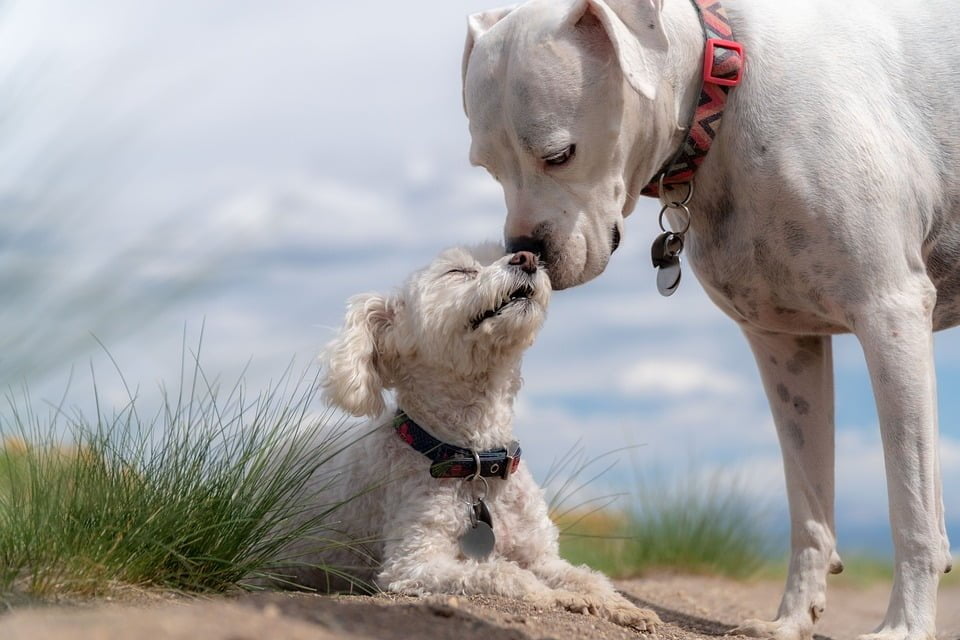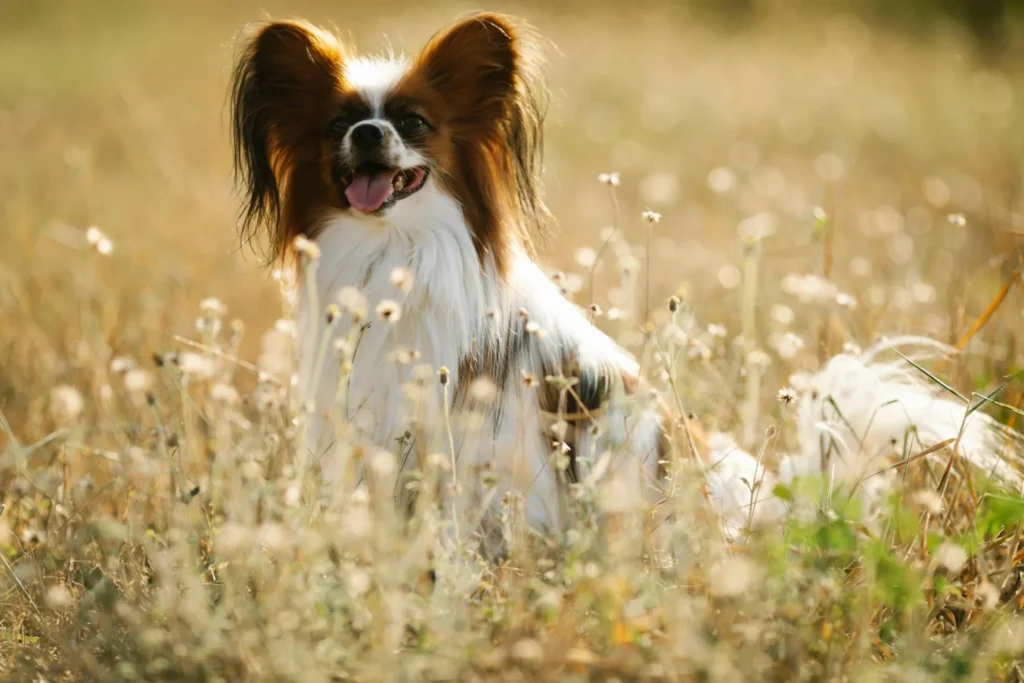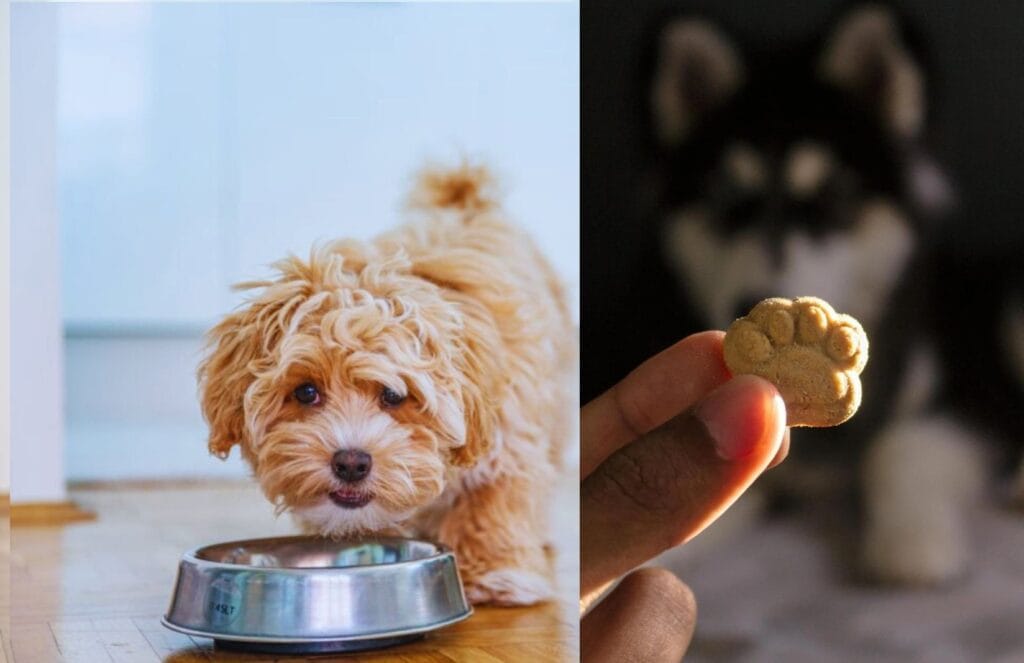When it comes to poodles, their elegant appearance and intelligent demeanor often overshadow concerns about potential aggression towards other dogs. However, like any breed, their behavior can vary depending on several factors. In this comprehensive article, we aim to address the common misconception about poodle aggression, providing insights into their temperament, socialization, and training needs.
While all poodles can exhibit aggression if not properly socialized and trained, toy poodles may be more prone to it due to their smaller size and potential for fear-based reactivity.
Understanding Poodle Temperament
Originally bred as water retrievers, poodles have a rich history dating back to the 15th century. These intelligent and highly trainable dogs were prized for their agility and retrieving skills in waterfowl hunting. Over time, their reputation as loyal companions and skilled performers in the circus and dog shows solidified their place as beloved family pets.
While poodles are often praised for their intelligence and trainability, it’s essential to recognize that their behavior is influenced by a combination of genetics, socialization, and training. Like any dog, poodles can exhibit aggression towards other dogs if not properly socialized and trained from an early age.
Poodle Aggression Towards Other Dogs: Fact or Fiction?
Contrary to popular belief, poodles are not inherently aggressive towards other dogs. In fact, with proper socialization and training, poodles can be exceptionally friendly and well-behaved around other canines.
Responsible poodle owners understand the importance of early socialization and positive reinforcement training. By exposing their poodles to various environments, situations, and other dogs from a young age, they can help their furry companions develop confidence and appropriate social skills.
| Poodle Variety | Size | Potential for Aggression |
|---|---|---|
| Standard Poodle | Large | Low to Moderate |
| Miniature Poodle | Medium | Low to Moderate |
| Toy Poodle | Small | Moderate |
This table provides an overview of the different poodle varieties and their general potential for aggression towards other dogs. While all poodles can exhibit aggression if not properly socialized and trained, toy poodles may be more prone to it due to their smaller size and potential for fear-based reactivity.
Grooming and Its Impact on Poodle Behavior
Poodles are known for their distinctive curly coats, which require regular grooming. Proper grooming not only maintains their appearance but also plays a crucial role in their overall well-being and behavior.
- Matting and Discomfort: Matted fur can cause discomfort and irritability in poodles, potentially leading to aggression towards other dogs or even their owners during grooming sessions.
- Grooming as Bonding: Regular grooming sessions provide an opportunity for positive interactions and bonding between the poodle and their owner, reinforcing trust and reducing anxiety.
- Professional Grooming: Seeking the services of experienced and gentle groomers can ensure a positive grooming experience for the poodle, minimizing any potential stress or discomfort.
Poodle Aggression and Age
Age can also play a role in poodle aggression towards other dogs. Understanding the potential behavioral changes at different life stages can help owners anticipate and address any aggression-related concerns.
| Life Stage | Potential Aggression Factors |
|---|---|
| Puppyhood (0-6 months) | Lack of proper socialization can lead to fear-based aggression later in life. |
| Adolescence (6-18 months) | Increased confidence and territorial behavior may contribute to aggression. |
| Adulthood (1-7 years) | Well-socialized and trained poodles are generally less aggressive, but underlying medical issues or situational triggers can still occur. |
| Seniority (7+ years) | Cognitive decline, sensory impairments, or health problems may increase irritability and aggression. |
- Puppyhood: Proper socialization during the critical socialization period (3-12 weeks) is crucial for preventing fear-based aggression towards other dogs in adulthood.
- Adolescence: Poodles may exhibit increased confidence or territorial behavior during adolescence (6-18 months), potentially leading to conflicts with other dogs if not properly managed.
- Adulthood: Well-socialized and trained adult poodles are generally well-adjusted and less likely to exhibit aggression towards other dogs, unless triggered by specific situations or underlying medical issues.
- Seniority: As poodles age, they may experience cognitive decline, sensory impairments, or health problems that can contribute to increased irritability or anxiety around other dogs.
Poodle Mixes and Aggression
With the rising popularity of designer dog breeds, poodle mixes (such as Labradoodles, Goldendoodles, and Maltipoos) have become increasingly common. While these hybrid dogs may inherit some characteristics from their poodle parent, their behavior can vary depending on the other breed’s temperament and the specific mix.
- Socialization and Training: Proper socialization and training are essential for all dogs, regardless of breed or mix, to prevent and manage potential aggression towards other dogs.
- Breed-Specific Traits: Owners of poodle mixes should research the temperament and behavioral tendencies of both parent breeds to better understand their dog’s potential for aggression and develop appropriate management strategies.
- Individual Differences: While general breed characteristics can provide insights, it’s important to remember that each dog is an individual, and their behavior can vary based on genetics, socialization, and environmental factors.
By understanding the various factors that can contribute to poodle aggression towards other dogs, owners can take proactive steps to create a harmonious and enriching environment for their furry companions.
Common Causes of Poodle Aggression Towards Other Dogs
While poodles are not inherently aggressive, there are several potential triggers that can contribute to aggressive behavior towards other dogs. Understanding these causes is crucial for responsible poodle ownership and effective management.
- Fear or lack of socialization: Poodles that have not been properly socialized from an early age may develop fear or anxiety around other dogs, leading to defensive or aggressive behavior.
- Territorial behavior: Some poodles may exhibit aggression when they perceive other dogs as encroaching on their territory, whether it’s their home, yard, or even their owners.
- Maternal instincts: Female poodles with puppies may become protective and aggressive towards other dogs, perceiving them as potential threats to their litters.
- Resource guarding: Poodles, like many dogs, can become possessive over valuable resources such as food, toys, or even their owners, leading to aggressive behavior towards other dogs that approach or attempt to access these resources.
- Medical issues: Underlying medical conditions, such as pain or illness, can contribute to increased irritability and aggression in poodles towards other dogs.
Recognizing Signs of Aggression in Poodles
Early intervention and professional help are crucial in managing poodle aggression towards other dogs. By recognizing the signs of aggression, owners can take proactive steps to address the issue before it escalates. Some common signs of aggression in poodles include:
- Body language cues: Growling, stiff posture, raised hackles, and baring teeth can indicate aggression.
- Situational triggers: Leash reactivity, proximity to other dogs, or specific environments may trigger aggressive behavior.
- Vocal cues: Barking, snarling, or whining can signal discomfort or aggression.
| Body Language Cue | Description |
|---|---|
| Growling | Low, guttural rumbling sound indicating aggression or a warning. |
| Stiff Posture | Rigid, tense body with minimal movement, often with raised hackles. |
| Baring Teeth | Lips pulled back, exposing the teeth as a sign of aggression. |
| Raised Hackles | The fur along the back and neck stands up, indicating arousal or aggression. |
| Whale Eye | When the whites of the eyes are visible, signaling discomfort or fear. |
| Ear Position | Ears flattened back or forward, depending on the type of aggression. |
Preventing and Managing Poodle Aggression

Preventing and managing poodle aggression towards other dogs requires a multi-faceted approach that involves proper socialization, positive reinforcement training, desensitization, and seeking professional help when necessary.
- Proper socialization from an early age: Exposing poodle puppies to various environments, people, and other dogs in a controlled and positive manner can help them develop confidence and appropriate social skills.
- Positive reinforcement training techniques: Reward-based training methods, such as clicker training or treat reinforcement, can effectively teach poodles desirable behaviors and build a strong bond between owner and dog.
- Desensitization and counterconditioning: These techniques involve gradually exposing the poodle to the trigger (e.g., other dogs) while providing positive reinforcement, helping them associate the trigger with pleasant experiences.
- Seeking professional help: If aggression persists or escalates, it’s essential to seek guidance from a certified dog trainer or behaviorist who can assess the situation and develop a personalized training plan.
Training Techniques for Managing Poodle Aggression
Effective training is a crucial component in preventing and managing poodle aggression towards other dogs. Here are some widely recommended training techniques:
- Positive Reinforcement Training
- This approach focuses on rewarding desirable behaviors with treats, praise, or other positive reinforcers.
- It helps build a strong bond between the poodle and owner while promoting good behavior.
- Techniques like clicker training and lure-reward training can be highly effective.
- Desensitization and Counterconditioning
- Desensitization involves gradually exposing the poodle to the trigger (e.g., other dogs) at a low level, while counterconditioning involves associating the trigger with positive experiences (treats, praise).
- This approach can help the poodle develop a more positive association with other dogs, reducing fear and aggression.
- Impulse Control Training
- Teaching poodles impulse control can help manage their reactivity and impulsive behavior around other dogs.
- Exercises like “Leave It,” “Stay,” and “Watch Me” can promote self-control and focus on the owner’s commands.
- Socialization and Controlled Interactions
- Continuing socialization with calm, well-behaved dogs in controlled environments can help poodles develop appropriate social skills and confidence.
- It’s essential to start slowly and at a distance, gradually increasing proximity and interaction under supervision.
- Environmental Management
- Identifying and managing potential triggers, such as resource guarding or territorial behavior, can help prevent aggression towards other dogs.
- Providing enough exercise, mental stimulation, and appropriate resources can also reduce stress and frustration.
While these techniques can be effective, it’s important to remember that every poodle is unique, and their response to training may vary. Seeking guidance from a certified professional dog trainer or behaviorist can ensure a personalized approach tailored to your poodle’s specific needs.
Poodle Sports and Activities for Socialization
This table outlines various poodle sports and activities that can facilitate socialization with other dogs. It describes each activity, its benefits, and how it can help poodles develop positive associations and appropriate behavior around other canines.
| Activity | Description | Benefits |
|---|---|---|
| Agility | Dog navigates an obstacle course while following handlers’ commands. | Builds focus, confidence, and positive associations with other dogs. |
| Obedience Trials | Dogs perform various obedience exercises and commands in a competitive setting. | Reinforces training, teamwork, and exposure to other dogs. |
| Canine Good Citizen | Program that teaches basic obedience and good manners in various situations. | Promotes appropriate behavior around other dogs and people. |
| Group Training Classes | Classes where multiple dog owners train together under a professional’s guidance. | Provides socialization opportunities and reinforces training. |
The Importance of Consistency and Patience
Consistency and patience are key when training poodles to manage aggression towards other dogs. Changing behavior takes time and repetition, and setbacks or regression may occur.
- Consistency in training methods, rules, and responses from all family members is crucial for effective learning.
- Patience is essential, as progress may be gradual, and rushing the process can lead to setbacks or negative associations.
- Celebrating small victories and remaining positive can motivate both the poodle and the owner throughout the training journey.
By combining proven training techniques with consistency and patience, poodle owners can successfully manage and minimize aggression towards other dogs, creating a safe and enjoyable environment for all.
Reputable Poodle Breeders and Temperament Testing
Choosing a reputable poodle breeder can play a significant role in acquiring a well-socialized and temperamentally sound poodle. Responsible breeders prioritize health, temperament, and socialization from an early age.
- Temperament Testing
- Reputable breeders often conduct temperament testing on their litters to assess each puppy’s personality and potential for aggression or other behavioral issues.
- This information can help match prospective owners with the most suitable puppy for their lifestyle and experience level.
- Early Socialization
- Responsible breeders expose their poodle puppies to various sights, sounds, and experiences during the critical socialization period, promoting confidence and adaptability.
- This early socialization can lay the foundation for a well-adjusted poodle that is less likely to exhibit aggression towards other dogs.
- Health and Genetic Testing
- Reputable breeders prioritize genetic testing for inherited health conditions and only breed from healthy, temperamentally sound parents.
- This approach helps minimize the risk of genetic predispositions to aggression or other behavioral issues.
While acquiring a poodle from a reputable breeder is not a guarantee against aggression, it increases the chances of getting a well-socialized and temperamentally sound pup, setting the stage for successful training and management of any potential aggression towards other dogs.
Remember, responsible ownership and ongoing training and socialization are essential regardless of the poodle’s background or breeder.
Success Stories: Poodles Living Harmoniously with Other Dogs
Despite the misconceptions surrounding poodle aggression, countless success stories highlight the breed’s ability to coexist peacefully with other dogs. With patience, consistency, and positive reinforcement, many poodle owners have successfully trained their furry companions to become well-socialized and friendly towards other canines.
“Our standard poodle, Coco, used to be reactive towards other dogs on walks. With the help of a professional trainer and consistent training, she now greets other dogs calmly and enjoys playdates at the dog park.”
– Sarah, a proud poodle owner
| Owner’s Name | Poodle Breed | Approach |
|---|---|---|
| Sarah | Standard Poodle | Professional training and consistent socialization at dog parks. |
| Mark | Miniature Poodle | Early socialization, positive reinforcement training, and controlled playdates. |
| Emily | Toy Poodle | Desensitization and counterconditioning, impulse control training. |
These success stories serve as inspiration and proof that poodles can thrive in multi-dog households or social settings when their needs for socialization and training are met.
Frequently Asked Questions
Q: Are certain poodle varieties (standard, miniature, toy) more prone to aggression?
A: While there is no definitive evidence that any particular poodle variety is more aggressive, proper socialization and training are crucial for all sizes of poodles, regardless of their variety.
Q: Can poodle aggression towards other dogs be cured?
A: While aggression can be managed and minimized through consistent training and behavior modification, it’s important to note that aggression is not a curable condition. Early intervention and ongoing management are essential for successful outcomes.
Q: Is it safe to have a poodle and another dog together?
A: Yes, it is generally safe to have a poodle and another dog together, provided that both dogs are properly socialized, trained, and introduced gradually under supervision. However, it’s essential to monitor their interactions and provide adequate exercise, mental stimulation, and appropriate resources to minimize potential conflicts.
Q: At what age should socialization with other dogs begin for poodles?
A: Socialization should begin as early as possible, ideally during the critical socialization period between 3 and 12 weeks of age. However, socialization is an ongoing process, and poodles of any age can benefit from positive exposure to new experiences, including interactions with other dogs.
Conclusion:
In conclusion, poodles are not inherently aggressive towards other dogs. With proper socialization, training, and responsible ownership, these intelligent and loyal companions can coexist harmoniously with other canines. By understanding the common causes of aggression, recognizing early signs, and implementing effective prevention and management strategies, poodle owners can cultivate a positive and enriching environment for their furry friends.
Remember, every dog is an individual, and their behavior is shaped by various factors. Seeking guidance from professionals, such as certified dog trainers or behaviorists, can provide valuable insights and personalized solutions to address any concerns or challenges that may arise.
Ultimately, the key to a happy and well-adjusted poodle lies in patience, consistency, and a commitment to providing a nurturing and supportive environment where they can thrive alongside their canine companions.



